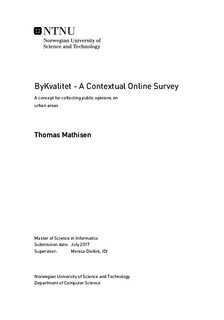ByKvalitet - A Contextual Online Survey - A concept for collecting public opinions on urban areas
Master thesis
Permanent lenke
http://hdl.handle.net/11250/2454101Utgivelsesdato
2017Metadata
Vis full innførselSamlinger
Sammendrag
Planners in urban development planning processes make their decisions based on knowledge about the city as it is now and what needs improvement. The foundation of this knowledge is data collected about the city using various methods. City Life Survey is a collective term for surveys investigating how the city is being used and experienced by its citizens. This study has followed a Design Science Research Methodology, with the goal of finding an easier way of collecting data relevant for City Life Surveys without the need for hiring a large number of observers or interviewers to do so.
The study started by investigating what data public planners are interested in gathering about the city's environment. An analysis of what data City Life Surveys typically gathers has been conducted using 17 City Life Surveys, noting what data each of them gathered. The analysis found that different surveys collected a broad range of data parameters and that the surveys differed from one another in what data they collected. A brief analysis of the different data parameters' attributes found that they were diverse and that a single system would not be able to collect all data types. A subset of the data parameters found in the analysis, citizens' subjective opinions about city areas, was selected as the subject of data gathering using ICT technology. The selection of subjective opinions was made because this category of data appeared easier to gather using a software system alone than the other categories.
As part of this study, a prototype of a system called bykvalitet.no, collecting subjective opinions from citizens about city areas has been developed. The prototype is based on requirements derived from problem areas in public participation in urban planning, and the analysis of city life surveys conducted. Guidelines for usability, visual design, and survey design were also applied. The result is an online web page where people can provide their subjective opinion for a location in a city in the form of a feedback report. The feedback reports are displayed on a map in the system, allowing for reviewing feedback provided for different areas of the city.
An evaluation of the prototype was done using interviews with experts and usability testing with non-experts. The usability testing showed that the survey portion of the app had high usability, with the visualization- and map-part having room for improvement. The experts confirmed that the concept and prototype have a potential for use in urban planning as well as a potential for improvement. Finally, guidelines for further developing the prototype or similar systems have been made and presented of the experiences of the development process and the evaluation.
